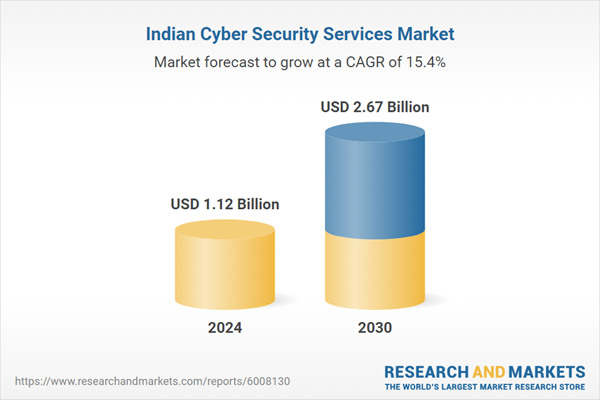Speak directly to the analyst to clarify any post sales queries you may have.
10% Free customizationThis report comes with 10% free customization, enabling you to add data that meets your specific business needs.
The rise in high-profile cyber-attacks and data breaches has heightened awareness of the need for robust security measures, prompting organizations to invest in comprehensive security frameworks. Additionally, stringent regulations and compliance requirements, such as the Information Technology Act and data protection laws, are further fueling market expansion. The rapid adoption of digital technologies, including cloud computing and the Internet of Things (IoT), has created new vulnerabilities, driving the need for specialized cyber security services. As a result, the market is witnessing increased investments from both public and private sectors, leading to a dynamic and rapidly evolving landscape that continues to attract significant interest and growth opportunities.
Key Market Drivers
Increasing Cyber Threats
The escalating frequency and sophistication of cyber threats are a primary driver of growth in the India Cyber Security Services Market. As digital transformation accelerates across industries, the volume and complexity of cyber-attacks have risen sharply. High-profile breaches, ransomware attacks, and advanced persistent threats (APTs) are becoming more common, posing severe risks to organizational data and operations. This environment has heightened the need for advanced security measures to protect sensitive information and maintain operational integrity. Indian companies and government entities are investing heavily in cyber security services to safeguard their digital assets from these emerging threats. The growing prevalence of cyber-attacks across sectors, including finance, healthcare, and critical infrastructure, underscores the necessity for robust cyber defense mechanisms, driving demand for comprehensive security solutions.Key Market Challenges
Skill Shortage in Cyber Security Talent
One of the most significant challenges facing the India Cyber Security Services Market is the acute shortage of skilled cyber security professionals. The rapidly evolving nature of cyber threats and the increasing complexity of IT environments require a highly specialized skill set. However, the demand for cyber security experts far exceeds the supply, leading to a talent gap that hampers the ability of organizations to effectively manage and respond to security threats.This shortage is exacerbated by the continuous advancement of cyber threats, which demands ongoing education and training for cyber security professionals. The scarcity of qualified personnel not only strains existing resources but also increases operational costs for businesses as they compete to attract and retain top talent. Organizations may struggle to implement and maintain comprehensive security strategies, leaving them vulnerable to attacks. Addressing this challenge requires a multifaceted approach, including investments in education and training programs, partnerships with academic institutions, and initiatives to attract and retain talent in the cyber security field.
Key Market Trends
Increased Adoption of AI and Machine Learning
The integration of Artificial Intelligence (AI) and Machine Learning (ML) technologies into cyber security services is rapidly transforming the India Cyber Security Services Market. AI and ML are being leveraged to enhance threat detection, automate responses, and predict potential vulnerabilities. These technologies analyze vast amounts of data to identify patterns and anomalies that might indicate a cyber threat.By using AI-driven analytics, organizations can achieve more accurate and faster threat detection compared to traditional methods. Additionally, ML algorithms are continuously learning and adapting to new threats, providing more robust protection against evolving cyber attacks. The adoption of AI and ML not only improves the efficiency of security operations but also reduces the reliance on manual intervention, allowing security teams to focus on strategic tasks. As the sophistication of cyber threats grows, the demand for AI and ML-based solutions is expected to increase, driving innovation and growth in the cyber security sector.
Key Market Players
- Cisco Systems, Inc.
- IBM Corporation
- Palo Alto Networks, Inc.
- Check Point Software Technologies Ltd.
- Fortinet, Inc.
- McAfee, LLC
- Trend Micro, Incorporated.
- Sophos Limited
- CrowdStrike Inc.
- Splunk Inc.
Report Scope:
In this report, the India Cyber Security Services Market has been segmented into the following categories, in addition to the industry trends which have also been detailed below:India Cyber Security Services Market, By Size of Organization:
- Small & Medium Enterprises
- Large Enterprises
India Cyber Security Services Market, By Security Type:
- Vulnerability & Security Assessment
- Threat Intelligence & Business Analytics
- Auditing & Logging
- Continuous Monitoring & Encryption
- Identity & Access Management
India Cyber Security Services Market, By End-user Industry:
- Healthcare
- BFSI
- IT & Telecom
- Government
- Energy & Utilities
India Cyber Security Services Market, By Region:
- North India
- South India
- West India
- East India
Competitive Landscape
Company Profiles: Detailed analysis of the major companies present in the India Cyber Security Services Market.Available Customizations:
With the given market data, the publisher offers customizations according to a company's specific needs. The following customization options are available for the report.Company Information
- Detailed analysis and profiling of additional market players (up to five).
This product will be delivered within 1-3 business days.
Table of Contents
Companies Mentioned
- Cisco Systems, Inc.
- IBM Corporation
- Palo Alto Networks, Inc.
- Check Point Software Technologies Ltd.
- Fortinet, Inc.
- McAfee, LLC
- Trend Micro, Incorporated.
- Sophos Limited
- CrowdStrike Inc.
- Splunk Inc.
Table Information
| Report Attribute | Details |
|---|---|
| No. of Pages | 86 |
| Published | September 2025 |
| Forecast Period | 2024 - 2030 |
| Estimated Market Value ( USD | $ 1.12 Billion |
| Forecasted Market Value ( USD | $ 2.67 Billion |
| Compound Annual Growth Rate | 15.4% |
| Regions Covered | India |
| No. of Companies Mentioned | 10 |









